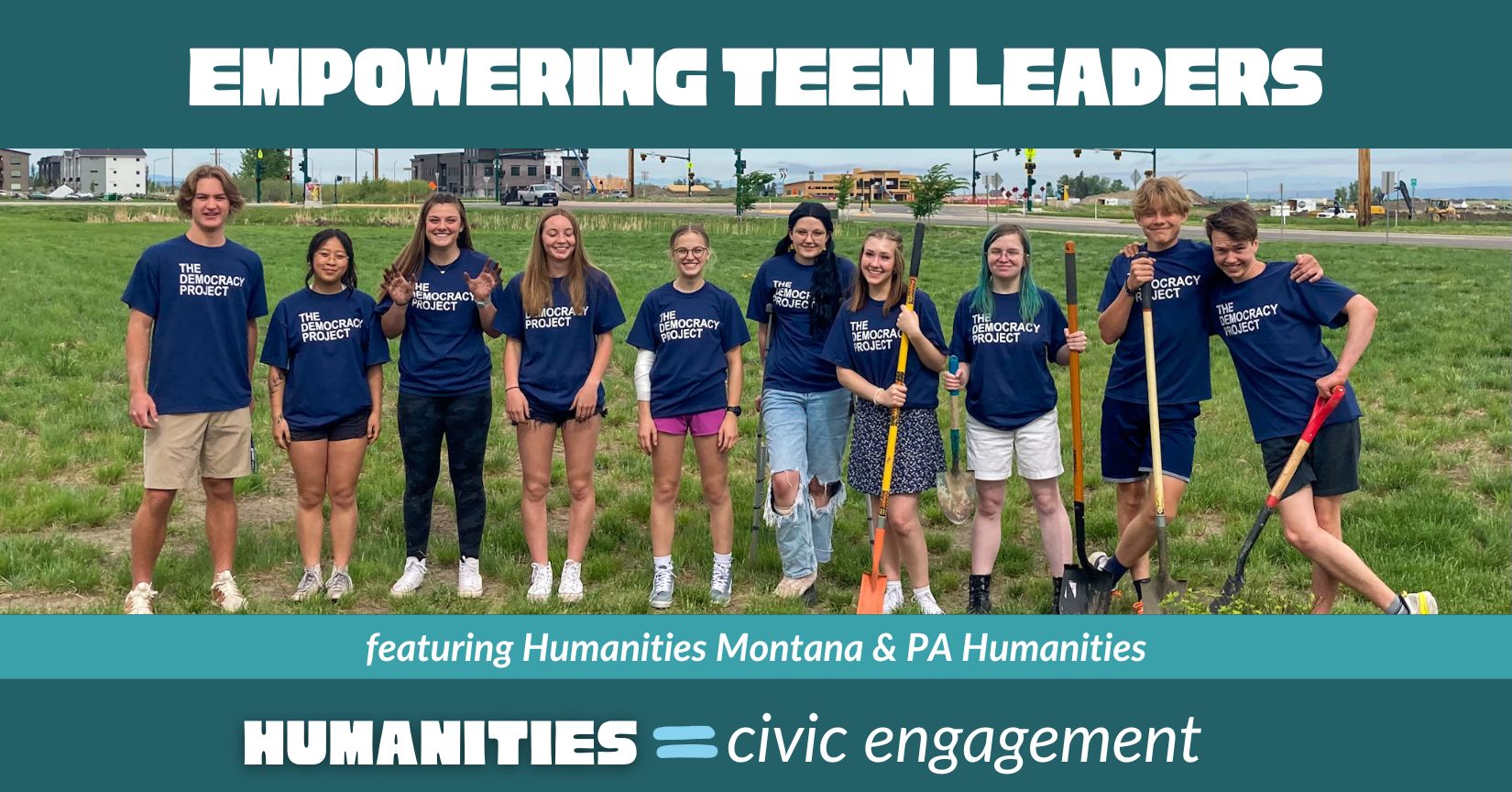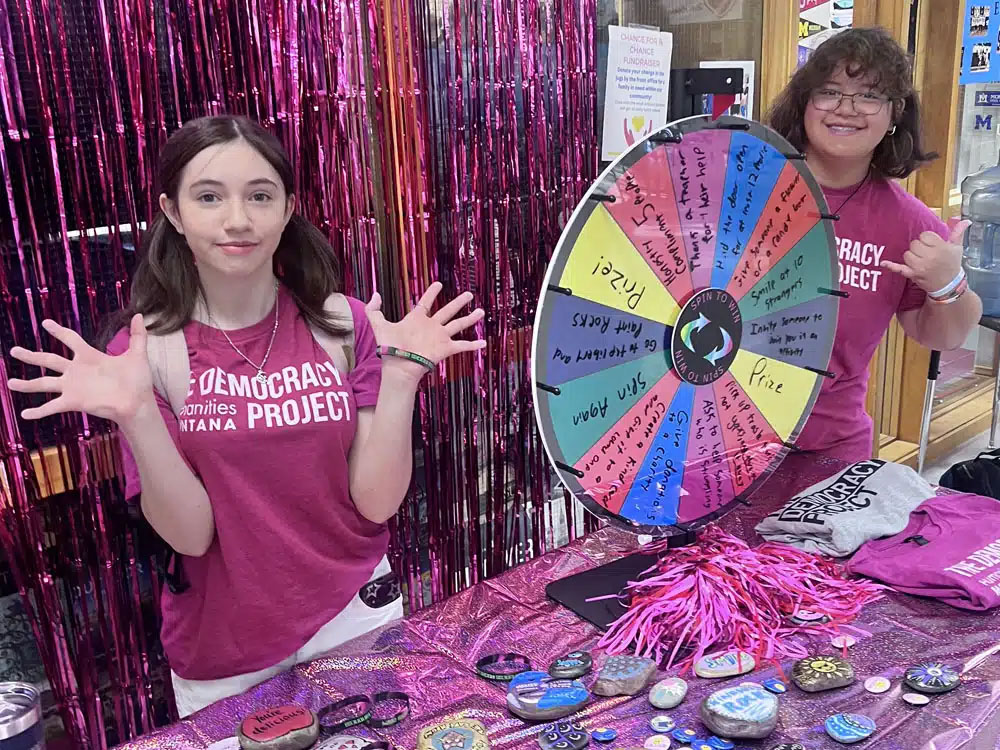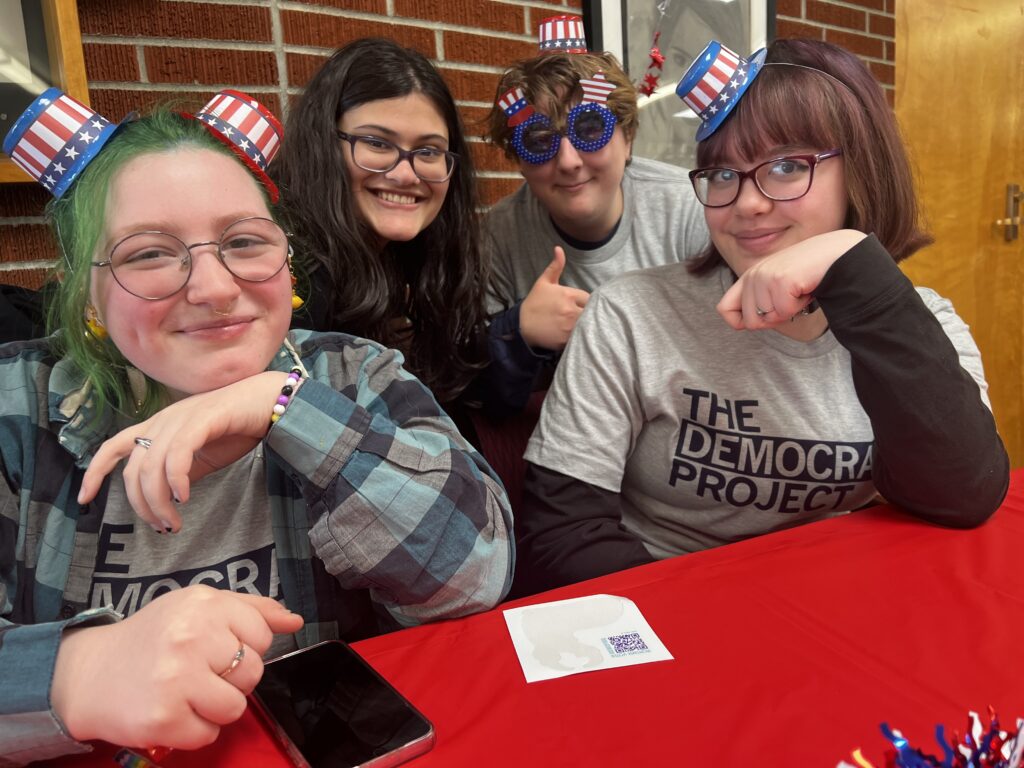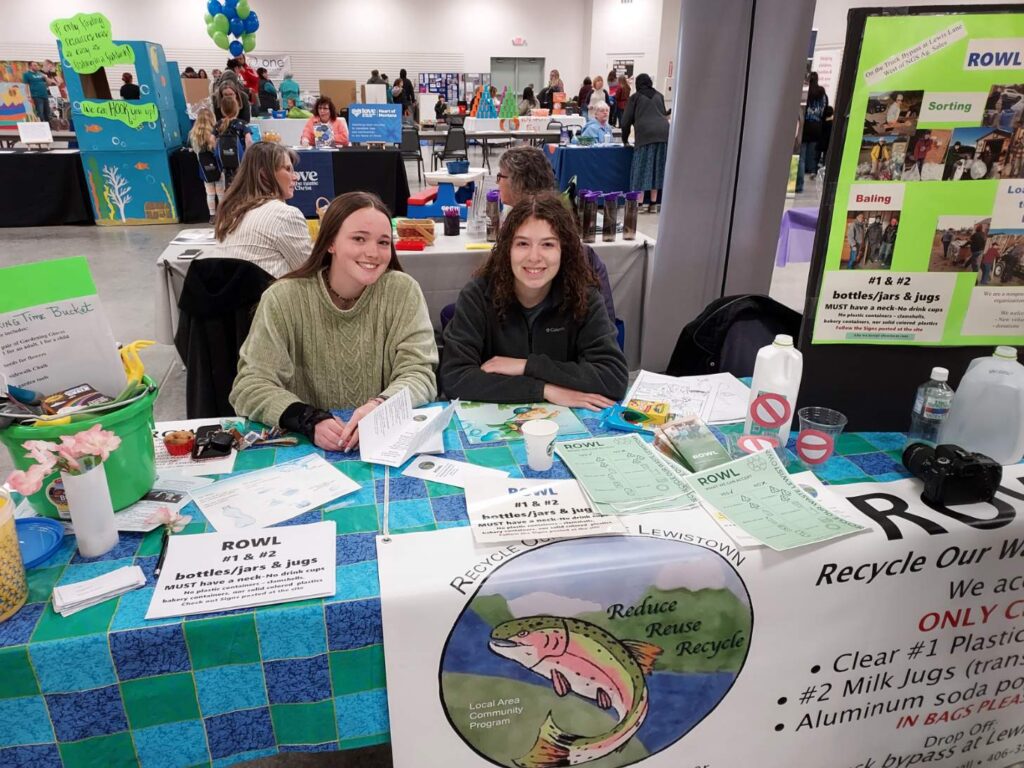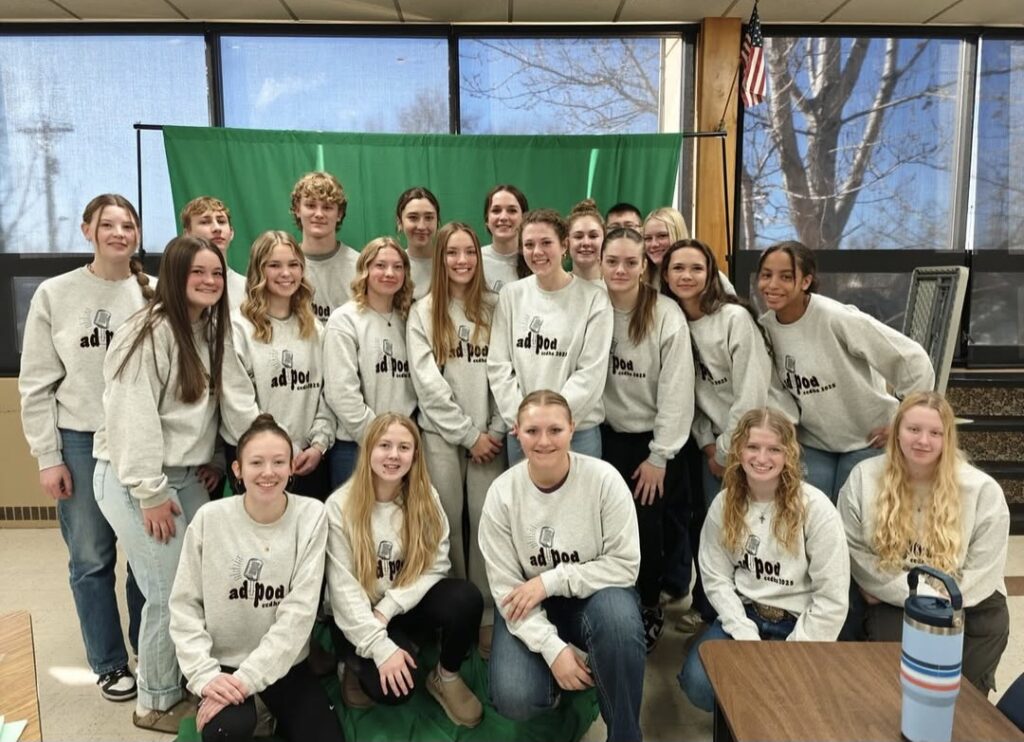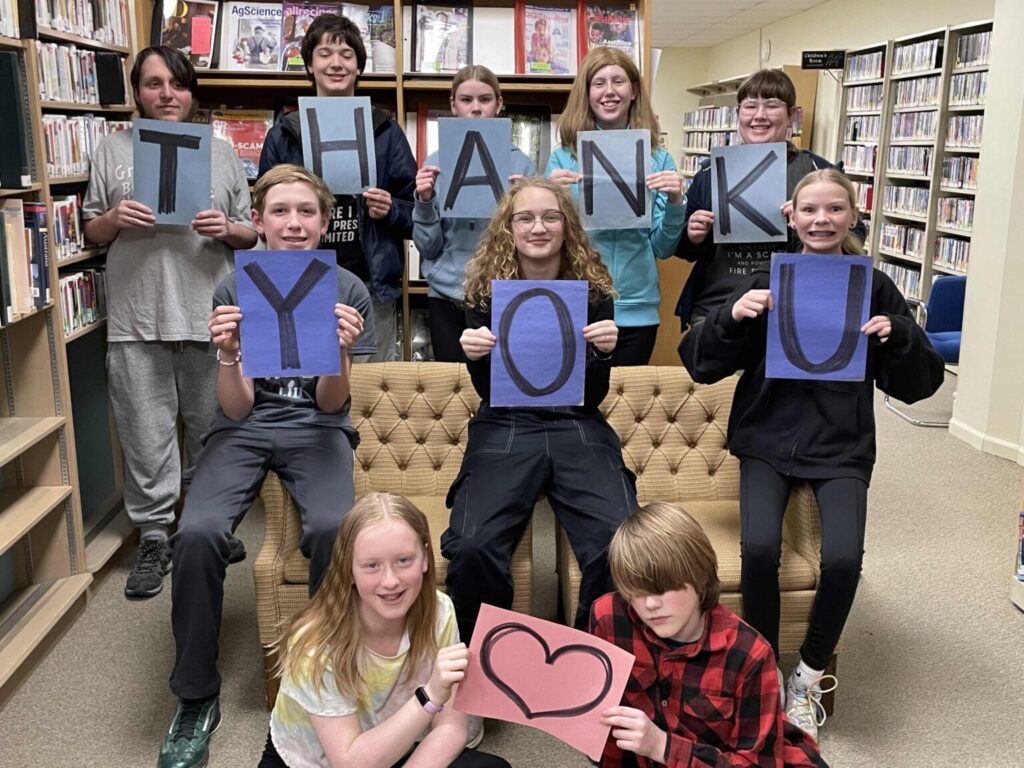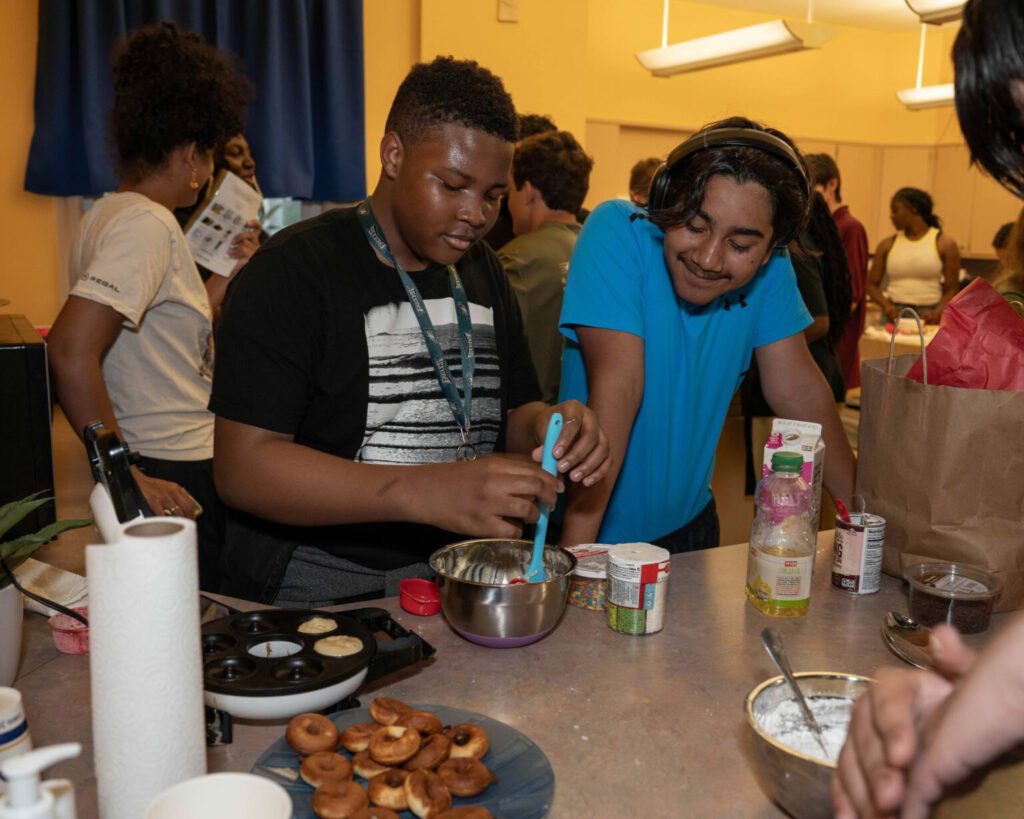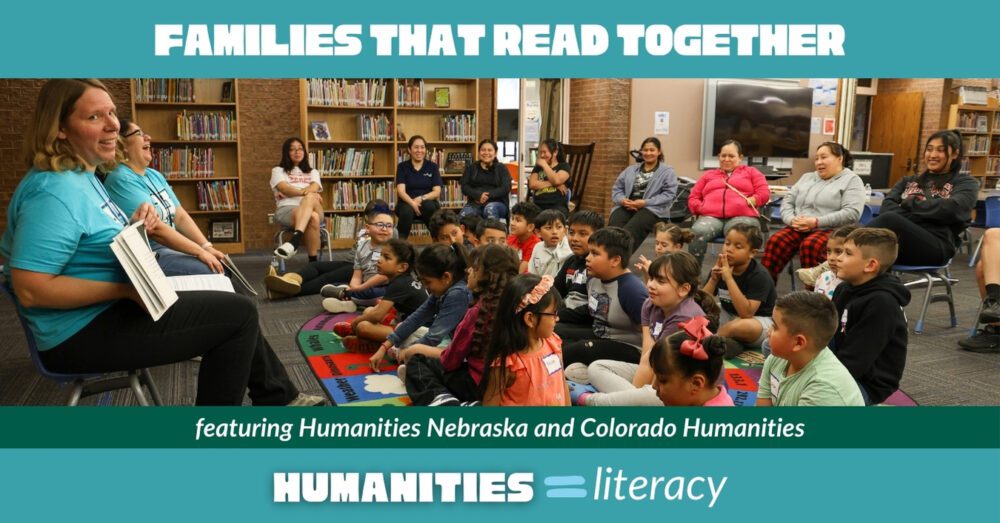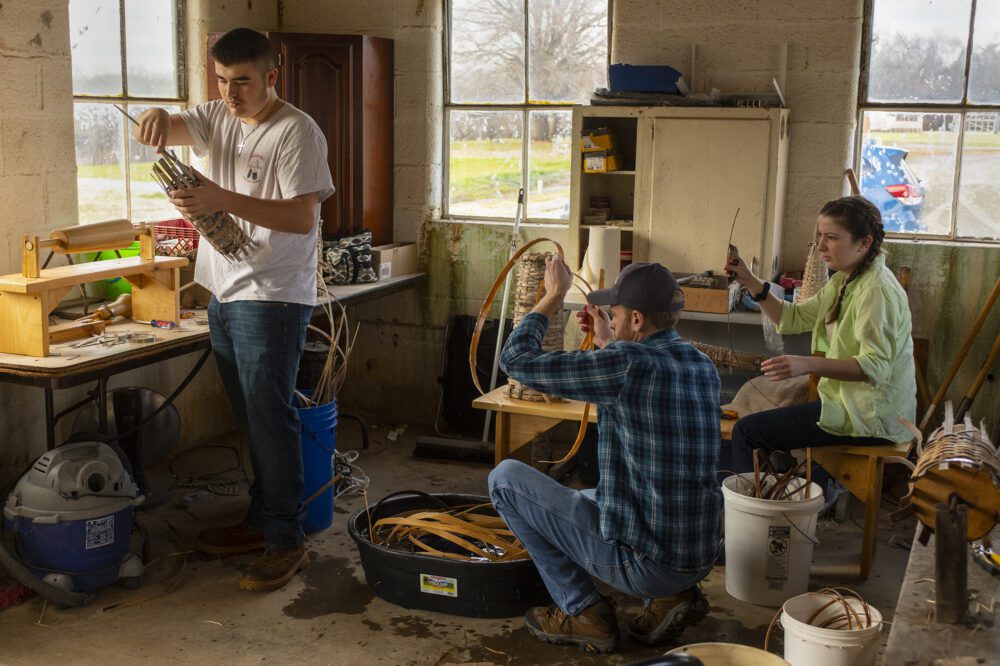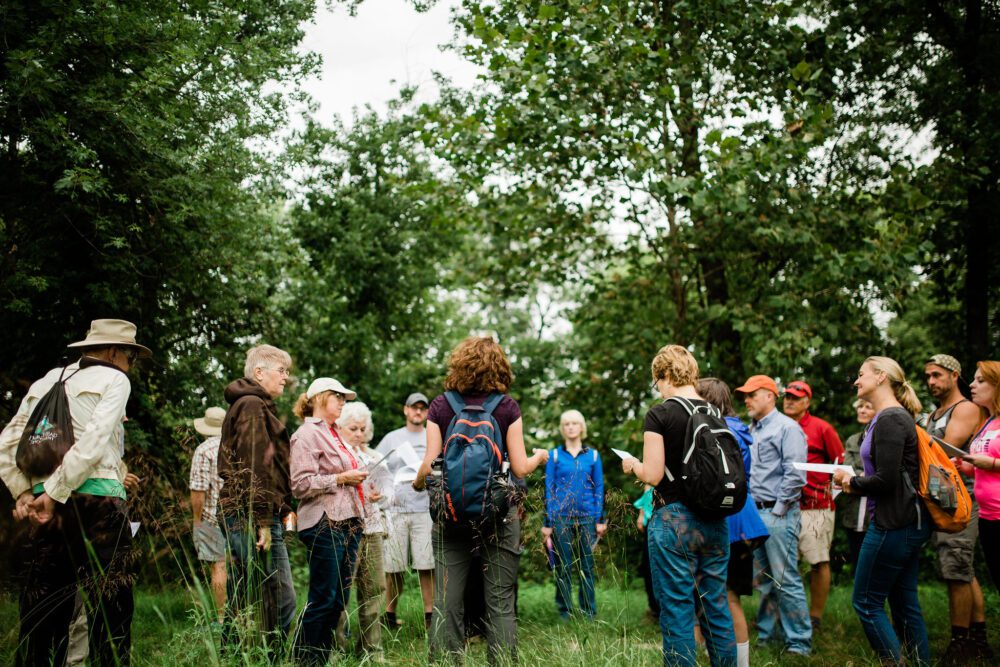Episode Description
It’s true that youth are the future, but we have to give them the tools and skills to make it a good one. In this episode, we’re taking a closer look at two programs using the humanities and public libraries to inspire and empower teens to speak up and play an active role in their communities. In Montana, the Democracy Project from Humanities Montana brings teens together via their local library to learn about civics and design a project to meet a need in their community. In Pennsylvania, PA Humanities’ Youth Led Humanities provides funding and support to libraries for humanities clubs and projects that let teens take the lead. Both these programs aim to give teens opportunities to lead, find their voice, and understand how much power they have to tackle problems and make positive change in their schools and communities.
Listen
Humanities = is available on all major podcast platforms. Listen on your browser by using the player above or find your preferred platform here.
Guests
The Democracy Project
Jenny Bevill is the Program Coordinator at Humanities Montana
Sarah Peterson is the Director of the Miles City Library
Emma Wilcox is a junior at Columbia Falls High School
Youth-Led Humanities
Julia Katz is the Education Program Manager at PA Humanities
Heather Manchester is the Director of the Sayre Public Library
Rianna Powers is a teacher and Youth-Led Humanities facilitator
Sam and Colton are middle schooler participants in Youth-Led Humanities in the Sayre-Athens area
Show Notes/Learn More: Humanities Montana and The Democracy Project
Founded in 1972, Humanities Montana serves Montana’s multicultural communities through stories and conversation. They offer experiences that nurture imagination and ideas by speaking to Montanans’ diverse history, literature, and philosophy.
The Democracy Project is a teen-led, non-partisan initiative supported by local libraries, community partners, and Humanities Montana. This program gives teens the resources to meet community needs while learning their role in an evolving democracy. Through direct civic engagement, teens work for six months on projects they feel are vital to their community, ending with a public showcase.
Further Reading/Watching/Listening
Read this Federation profile on The Democracy Project, written after we awarded the program a 2024 Schwartz Prize .
Read this news story from KTVH on Helena teens in the program trying get a new law passed.
Check out an episode of Advisory Pod, the morning announcement show that Miles City Public Library Director Sarah Peterson discussed in the episode.
Columbia Falls teens hold a kindness day in 2023.
Teens in Columbia Falls, MT, put on a voter registration drive in 2022.
Teens in Lewistown expanded their town’s recycling program.
The teens behind Advisory Pod/Ad Pod, created in Democracy Project in Miles City.
Show Notes/Learn More: PA Humanities and Youth-Led Humanities
Founded in 1973, PA Humanities’ mission is to champion the humanities to spark civic engagement, build community, educate, inspire, and make long-lasting change. They envision a future where all Pennsylvanians use shared humanity as an essential tool to enhance personal growth, connect communities, and foster positive change.
Built on the belief that encouraging youth to choose creative programs based on their own interests is crucial to adolescent development, PA Humanities created Teen Reading Lounge (TRL) an award-winning, unconventional approach to book clubs that offers a safe space for ages 12 to 18. Youth-led Humanities reflects the evolution of what PA Humanities have learned from TRL about working with young people and supporting individuals doing youth humanities programming. This opportunity aims to expand their youth-led humanities’ network and make space for sites that are already doing impactful humanities-based and/or youth-led programming. In short, they wish to create more opportunities for youth to lead and feel affirmed in humanities spaces by supporting a variety of activities.
Further Reading/Watching/Listening
PA Humanities has written several stories about the project teens have tackled in Teen Reading Lounge and Youth-Led Humanities
- In Norristown, teen-led cultural cooking sessions became a bridge between them, connecting families, history and cultures.
- Inspired by their book selections and a growing interest in mental health awareness, seven teens in Brandywine completed Teen Mental Health First Aid Training, presented by the National Council for Mental Wellbeing
- In Upper Darby, teens engaged Representative Mary Gay Scanlon (PA-05) in an hour-long conversation about issues they were concerned about: education, gun violence, the environment, and mental health issues.
- In Aliquippa, youth participants got a chance to sit in the director’s seat and help produce a video about their recent environmental work cleaning up their neighborhood.
- A YA novel about families held in internment camps led to teens in Erie launching a project to help those experiencing homelessness.
- The library of Lackawanna County was awarded a PHC Cares grant to provide anti-racism/mental health kits to children and adults.
Teens in Brandywine take a thank-you photo for the members of the community who gave matching funds to support a mental health training program they participated in.
Teens in Norristown show off their cultures through cooking and sharing recipes.
What are Humanities Councils?
Our nation’s 56 state and jurisdictional humanities councils are nonpartisan 501(c)3 nonprofit organizations established in 1971 by Congress to make outstanding public humanities programming accessible to everyday Americans. Councils are funded in part by the National Endowment for the Humanities (NEH) and connected by their national membership association, the Federation of State Humanities Councils.
Episode Transcript
Read Episode Transcript
[Theme music plays]
Sam:
So, people always talk about teens being the future of the world…
Julia Katz: Young people tend to have bolder and more innovative ideas than us cynical adults. We need their ideas. And young people are really powerful when they’re armed with truth and knowledge.
Emma: Teens should learn from an early age that they have the voice, they have the power…
Jenny Bevill: because they’re building their own future communities. And I love that they’re thinking critically at such a young age and being intentional about what they want their communities to be like.
Hannah Hethmon (Narration): You’re listening to Humanities =, a podcast about real individuals, organizations, and communities making a real difference through the humanities.
I’m your host, Hannah Hethmon.
Humanities = is a production of the Federation of State Humanities Councils.
I’m going to open with a quote from one of my guests that really sums up the theme of this episode:
Julia Katz:We see many young people today struggling with feelings of isolation and alienation and the humanities can be a bridge to connection and belonging and a powerful tool to make change.”
Hannah Hethmon (Narration): It’s true that youth are the future, but we have to give them the tools and skills to make it a good one. In this episode, we’re taking a closer look at two programs using the humanities and public libraries to inspire and empower teens in Montana and Pennsylvania to speak up and play an active role in their communities.
In Montana, the Democracy Project from Humanities Montana brings teens together via their local library to learn about civics and design a project to meet a need in their community. In Pennsylvania, PA Humanities’ Youth Led Humanities provides funding and support to libraries for humanities clubs and projects that let teens take the lead. Both these programs aim to give teens opportunities to lead, find their voice, and understand how much power they have to tackle problems and make positive change in their schools and communities.
We’ll start in Montana. To learn more about the Democracy Project, I spoke to Jenny, the programs manager at Humanities Montana; Sarah, a library director who runs the program in Miles City, and Emma, a high-school student on the other side of the state in Columbia Falls who’s gone through the program two times.
Jenny Bevill:
Hi everybody, I’m Jenny Bevill and I’m the Programs Manager at Humanities Montana. And I’ve been developing and managing the Democracy Project since the beginning in 2021.
The Democracy Project is a teen-led, as you can see, nonpartisan initiative supported by local libraries, community partners, and Humanities Montana. And the program gives teens the resources to meet community needs while learning their role in an evolving democracy. So, through direct civic engagement, they work for six months on projects they feel are vital to their community, and they end with a public showcase.
The inspiration came from a program called Teens Leading Change at the Los Angeles Public Library. And we felt teens are an important group to engage in civics because Montana, like many states, only provides one semester course in civics. So, following the lead of Teens Leading Change, we felt we could create a program where teens had some actual agency and power and where they could practice these skills and see the outcomes in the real world.
We have had projects range from teens in Helena writing a bill in support of teen mental health services in schools and presenting it to the state legislature, giving proponent testimony, getting the bill funded by the Office of Public Instruction. Unfortunately, that bill did not get out of committee, but that was a huge thing that we didn’t even know was gonna happen. Then we’ve had other groups create a grocery delivery service for their town. The grocery store was 30 miles away and so they wanted to create that service and they did and delivered groceries there. In Lewistown they expanded the recycling program. In East Helena, they had a clothing drive for veterans. We’ve had sites revitalize a lot of things, so revitalization of parks and different school infrastructure, and even addressing food insecurity for teens.
Hannah (Narration): For our teen perspective on the program, Emma Wilcox, a two-time participant in the Democracy Project, joined us from Columbia Falls, a city of about 5,700 people in the northwest of the state near Glacier National Park.
Emma Wilcox: So, I’m a student from Columbia Falls High School. I’m a junior. I’m in a lot of clubs like Democracy Project, Student Council, Speech and Debate. I try to involve myself with anything that’s speech related, I guess, because I would see myself in a career like that when I’m older.
Hannah:
Tell me a little bit about your city and what it’s like to be a high schooler where you live.
Emma:
Okay, so Columbia Falls is kind of a smaller community, I would say, but not too small for Montana. We have a lot of banks. We have so many banks. But the high school there, since it’s a smaller community, a lot of people know each other, especially within the grade. Recently we’ve been having a little problem with cyberbullying. Like despite the fact that we like know each other online, we tend to think we’re anonymous or something, even though like names are shared, and we’ve been doing some stuff to try to ease it, sometimes it’s difficult. But overall, we’re a pretty nice community, I would say. We have so many fun activities during holidays and lots of parades and stuff and it’s a really nice town.
Hannah:
That’s great. And so, you’ve been involved in Democracy Project for a few years now. Tell me about getting involved with Democracy Project and what your projects were.
Emma:
So last year we had this kindness day, sort of week that we put on. We also put it on the year before, which was my first year in Democracy Project. And what we did was try to encourage kindness within our high school. And we really focused on pink shirt day and anti-bullying. It was something that a lot of people that had joined Democracy Project were passionate about because they felt the need for it in our community.
We also had this voter registration booth that we put on where we tried to we tried to convince students that were like 18 and older to register for voting and tried to up the statistics in that for our high school.
Hannah:
What was it like being in Democracy Project? How did you guys decide on your topic?
Emma:
So, we meet on Wednesdays at lunch, and we get donuts, which is really nice. And what we did was we kind of like as a group we pooled our ideas in and then we kind of, I say we voted, but it was more of a who likes this question more or this project more and who liked this project more. And then we planned it with our librarian who’s the head of Democracy Project in our school, and we decided to have like a rock painting activity which was really fun. We had a lot of people do that during lunch and after school and we actually took those rocks and spread them around our community in school and it was really nice and I think a lot of people have picked up the rocks because they just disappear like I haven’t seen them.
Hannah:
They had kind messages on them?
Emma:
Yeah, with really nice messages and cute drawings and it was a great activity and I believe we will be doing it this year because we did it the year before and the year before that.
Hannah (Narration): Librarians are a key part of the Democracy Project, and joining us to share that library perspective was Sarah Peterson, Director the Public Library in Miles City, which is home to about 8,000 people on the opposite side of the state from Columbia Falls.
Sarah Peterson:
Having come from teaching teens into the library, that’s the group that does not come to the public library. And I thought, well, what a great way to increase some engagement. And if not even having kids in the door, then they can learn more about what the library does and what it can do for them. And I really appreciated the fact that it was teen led. It’s not going to be something that somebody is telling these students to do. They get to choose.
Hannah:
Yeah, so tell me about the practical…what is it like for a student and the library to participate in this project?
Sarah:
You know, there’s kind of a suggestion that meeting weekly is a good choice. It really helps keep everybody on track and all of the ideas fresh in our minds. But at the end of the day, it’s up to the teens and their site. Everybody has a different way, a different place of meeting, different time, different food. I’ve done donuts, I’ve done pizza. That gets kids excited when we feed them. I think that really like underscores the flexibility of the program itself is that you do what’s going to work for you and for your group at the time. There’s no, there’s no handbook and that’s great.
Hannah:
And tell me about the projects that your teens have done in Miles City.
Sarah:
So, we are going into our third year as participants. We did a voter registration drive. And you know like, 13 and 14-year-olds, and they were the most passionate voter registers, registrars that I’ve ever seen. We worked with the community college here in town and they got 25 people in just a couple hours. And then last year I reached out to several high school teachers and the teacher of advanced English, so it’s just seniors, said, yeah, this is good. She really wants a community service aspect to be built in to kind of graduation requirements. So boy, did we talk for a long time with that group. It took us a long time to figure out what they wanted to do. There were 24 kids. And they decided they wanted to work on their school culture. And I think it’s pretty telling that my students that I worked with, hundreds of miles away from Emma’s school, we’re relatively the same size community, but very similar projects. School culture has to change.
And they wanted to do a podcast or a video cast during their morning kind of homeroom time. It’s called Advisory. And that developed, it took on its own life and went from this really boring reading the lunch menu for the week and happy birthday to so and so to their own Instagram page, all these fun segments shout outs to students and teachers and interviews and sports reporting and activity reporting. And they’re able to do it top to bottom by themselves. So, it’s really kind of taking on this life of students working for students, which I think is really a message coming from Columbia Falls too.
Hannah:
Fantastic. So, on that note, we’ll go back to you Emma and Tell me a bit how being involved with Democracy Project has impacted you? Has it has given you any skills or changed your ideas about what you might want to do in the future?
Emma:
So, when I first started high school, this was before I even learned Democracy Project was a thing, I like wanted to be a marine biologist basically. But once I started to join Democracy Project, and I started to get more involved in things like student council and things like speech and debate, I started to realize that I actually enjoy writing a lot more and would prefer to go into journalism and news reporting instead of marine biology. And I think that Democracy Project was the thing that kind of started, kickstarted that whole thing. I joined because my friend dragged me into it because her older cousin was in it before us. So that was my freshman year.
So, I joined this Democracy Project and I was like, cool, I get donuts every week. This is great. And then we kind of started talking about things that we wanted to do in Democracy Project, and I realized that there’s like stuff that I can do as a student, as a 14-year-old, that can impact my community and can make someone’s day brighter. And that kind of is what pulled me into Democracy Project and it’s the thing that keeps me in Democracy Project. It’s like created this obsession with changing different things in the world for the better, and I don’t know where it came from. But Democracy Project was definitely at the start of that.
Hannah:
Jenny, as the program enters its fifth year, can you say about the big picture impact? You have some numbers?
Jenny:
To date, Democracy Project has been in 26 libraries across the state, many of those libraries for multiple years. And I will say that in terms of numbers, many of our rural communities like Circle, Wibaux, Geraldine, for example, have populations between 200 and 500 people. So, numbers in that town, we have had groups as big as 15 in the smaller communities. But, also, we have had many small but mighty groups of between two and five super committed teens accomplish full projects like locker room revitalization or the installation of a tiny free library. And all the sites do run voter registration drives, because like Emma said and like Sarah mentioned, research shows that the earlier we vote, the more consistently we vote over our lifetimes.
We’ve a couple more project examples if I can squeeze those in. A couple of our larger libraries, for example, Gallatin High School in Bozeman, had 10 or 15 teens in their group and they raised over $50,000 to complete an outdoor classroom with native plants. So, it was both an educational classroom and also a relaxing space for people at the school and the community.
The program impact really is demonstrate, it can be demonstrated through the numbers, but really the impact also ripples out from the teens to their friends and family and their community members just sharing their enthusiasm for this type of civic engagement.
Hannah:
That’s fantastic. And really quickly, what’s the future of the program?
Jenny:
Well, we are really committed to staying in public libraries. So we do work with some school and community libraries and community college and tribal college libraries.
But we do feel that public libraries are really the foundation of democracy. You know, being third spaces, not work, not home, where everyone’s welcome, resources are free. Every community has one from the smallest rural towns to the biggest cities. So we really want to keep Democracy Project in libraries to establish that connection, like Sarah was talking, about between the teens and their local library and start that lifelong relationship.
Hannah:
Fantastic, all right, so everyone, there’s a final question for everyone. Why should teens be empowered to lead and make change in their communities?
Jenny:
One thing that a teen from Wibaux said and really stayed with me, she said, “Looking into the future, it’s important that this school and community stays tight and works together because eventually I’ll have a family of my own, I hope, and that is important when looking for a town or community to live in.” So, I feel like teens should be empowered to lead, this is me talking now, end quote.
They should be allowed and encouraged and empowered to lead and make change because they’re building their own future communities. And I love that they’re thinking critically at such a young age and being intentional about what they want their communities to be like.
Sarah:
So, I feel very strongly that the sooner teens learn that every decision they make has the power to create change. And you don’t have to wait till you’re 18 or you’re out of high school or you have a degree. But if you want to, you make those decisions. You can do it right now.
And I always say in support of this program generally: give teens a chance to be awesome and give them the trust and they will. They will be awesome, and they will show up.
Emma:
I have this large belief that teens are the next people that will be living in these communities and will be taking care of the people who have lived in these communities and that they should be able to have a say in what happens to this world that they’re going to inherit by other people, by their parents, by older people. And teens should learn from an early age that they have the voice, they have the power to change stuff in their community. It’s a strong point that we forget as teens in that it needs to be put out there more and we need to raise awareness of that, I guess.
[Musical transition]
Hannah (Narration): Our next story addresses a very similar need in a very different state. PA Humanities runs a program for Pennsylvania communities called Youth-Led Humanities. Their goal is to support and encourage local humanities programs where young people take the lead. When the program was created nearly 15 years ago, it was called Teen Reading Lounge and took the form of a super charged book club—students co-created their reading lists and designed projects and discussions around the readings. And then a few years ago, PA Humanities realized that youth-led humanities can take so many more forms than the book club model and so they expanded the program to include a wider range of programming and to make it a bit more flexible. Many communities still run Teen Reading Lounge or an expanded version of it, so just FYI you will hear Teen Reading Lounge and Youth-Led Humanities used interchangeably in this story.
Libraries who participate receive funding for program expenses, an honorarium for the program facilitator, and professional development for facilitators and libraries on youth engagement strategies.
To learn more about this program, I spoke to Julia Katz at PA Humanities as well as a few folks from the Sayre-Athens community: their library director, a program facilitator, and two middle school students.
Julia at PA Humanities kicked things off by sharing examples of how library-based groups around the state have used this flexible model and funding.
Julia Katz: This past year, we funded 17 libraries all across the state. Some examples I can share are at the Brandywine Community Libraries, following their students’ interests, they read and discussed books on the theme of mental health. And through their reading, the students were inspired to complete teen mental health first aid training from the National Council for Mental Well-Being. One student explained, they said, “We just understand that our friends might be going through something and we try to see what we might be able to do to help.” And then together they created and delivered 600 mental health support kits for local first responders.
In Upper Darby Township and Sellers Memorial Library, in addition to reading books, students also participated in civic engagement activities and learning about civic engagement along with their youth advisory council. And in April, they took a trip to Harrisburg to meet with legislators to advocate for libraries and to learn about the legislative process. They had lunch with their reps and Speaker McClinton, and they toured the Ryan Library and the Senate Library.
Hannah (Narration): Another project I thought was really neat is from the Montgomery-Norristown Public Library. These students wanted explore culture and family history through food, and so at each session, different students became “consultants” responsible for sharing family recipes or ones they found through library research. They interviewed family members, shared stories, and made crafts related to their cultures…which was a wonderful way for them to experience cultural and intergenerational exchange, ask questions about their family and cultural history, and practice sharing their research with peers.
Next, I wanted to hear from the Sayre-Athens students…
Sam:
My name is Sam. I’m a student at Harlan Road Middle School.
Colton:
I’m Colton. I’m also a student at Harlan Road Middle School.
Hannah: (00:13.102)
All right. So, Sam and Colton, let’s give our listeners some context. What is it like to live in, what is the Sarah Athens area like? And what is it like to be a student there?
Sam:
So, it’s really small. There’s a lot of farms around here and everything’s kind of really spread out.
Colton: We believe we also both live in different areas. She lives more in town. Yeah, I live a little bit And I live outside of town.
Hannah (Narration):
Like the Democracy Project, libraries and librarians are foundational to Youth-Led Humanities and Teen Reading Lounge. In the Sayre-Athens area, the program is coordinated by Sayre Public Library Director Heather Manchester.
Heather Manchester:
So, we were notified that we received the Teen Reading Lounge Grant in 2019. We kicked off our program in February of 2020. So that initial group that we got, we really did spend a lot of time online with that group. Once we were able to get back up and running in the library, we did a lot of different programming related to young adult literature. Our youth always had a voice in picking the books that they wanted to read.
We did some community outreach projects like we read a book about a youth in a juvenile detention center. So, with COVID we found out that a juvenile detention center near us, they were not able to have family visits during that time. So, we made communication kits that we sent up there so that the youth that were in the center could communicate with their families more easily.
Another one of our participants did a world cultures fair because she realized that even though we were not a diverse area, we do have pockets of diversity because of the hospital nearby and so she wanted to highlight the countries that some of these people in her school were coming from. So, we really have kind of done a lot of different things with our humanities and also branched out further from just books. So now we really explore a lot of different means of expression. We talk about art, we talk about film, we talk about music, which is definitely beyond where we started from.
Hannah:
Right. And so, Sam and Colton, if you were inviting a friend to join the Teen Reading Lounge, how would you describe to them what it is, what they can expect?
Sam:
So even though it’s called a reading lounge, it’s very lenient on the reading part. We mostly do stuff that’s like creativity focused. Like we’ve done bento box making, some collages with like old books and stickers and a lot of it is very targeted towards self-expression.
For me, it’s helped me speak up for myself a lot more. It’s helped me find my voice and be able to, I guess, yeah, stand up for myself when something happens.
Hannah:
Colton, any favorite memories from being involved in the group? What are some highlights?
Colton:
Yeah. Roll the Flow, it’s a podcast that we do just for the English program. We are going to talk about a bunch of different things about real world problems and stuff going on inside the school. The objective for the podcast is to inform more students in ways that they can understand better than if you were to watch a news channel or listen to your parents talking about some stuff.
Hannah:
And what does a regular meeting look like? What kind of things can people attending expect?
Heather:
I would say our regular program, we always have some sort of hands on something that we’re doing. So, it may be something that builds upon each other or maybe a one-off project. I’m thinking of we did a rock painting activity where we passed along messages to our local abuse and rape crisis center. And so that was a project that was sparked by Sam, whose mother volunteers with that organization. And so that was a kind of thing that we could get done in one session.
We do have other sessions where we’re kind of doing bigger projects or building or we have sessions where some of our discussions kind of turn into a bigger project which is what happened with the podcast that started with kind of conversations and ideas in the library and then transformed over into school. But definitely a lot of talking, a lot of relating to whatever form of media that we’re kind of interacting with at the time, whether it’s a book or whether we watched a film or listening to music, but definitely making sure those voices are always listened to, amplified, and kind of looking for sparks of where to go next from our group.
And I really think it’s neat with the idea of the humanities is sometimes we will take something that’s already been created. Let’s say like a book, we’re reading a book or we’re, you know, watching a clip of a film or something and discussing it. And then I think our participants really can take that and make that their own to see like, this is how people can capture their experiences and put them out into the world. And so that’s what we really want to encourage with our youth is not only to be consumers, but producers of these works of humanities to help them kind of form their own identities and share those identities and like Sam said become more comfortable and confident in those identities.
Hannah (Narration):
Also, in the classroom with Sam and Colton during this interview was their teacher, Rianna Powers, who serves as a facilitator for Youth-Led Humanities and Teen Reading Lounge.
Hannah: Rianna can I ask you a question while you are in the classroom? How have you seen this program impact the teens in your school and in this group?
Rianna:
So for them, I do really feel like it gives them that sense of identity and the ability to be involved more in their community and have a voice, to have those opportunities to be involved in leadership and create something as wonderful as like Row with the Flow, which is entirely run by the kids. Colton is actually the sound engineer and Sam is the producer. So, they have that kind of freedom to express the things that they want to, to pick the equipment and to give other students a voice, not just themselves, but the entire student body as well. And I think there’s a lot of power in that. It gives, like, even Teen Reading Lounge, our kids there, you know, they help come up and drive the program with things that they’re interested in, and that just further encourages them and their voices in the world that, you know, you can have a powerful voice, and it doesn’t matter your age, and every small bit of something, right, contributes to something much larger, and I think they see that over a period of time as well.
Prior to me being at Athens. I was actually at Sayre and we did a lot of things with the Sayre Public Library, did a lot of collaboration. And I always found that my students felt very comfortable in the library setting, very comfortable with their voices. They were more apt to choosing books that were about their identities. And it came to be that…you how can we help people? How can we help people kind of feel that level of comfort?
There was a big push for many years in school with STEM learning, right? It was all about science and math being the focus and we were losing that humanities piece, and kids were struggling. So, when we added this and we had that collaboration between the library and school, it brought that humanities piece in and kids started to have a little bit more of a voice and that built and it developed, and just understanding who we are and embracing that was really important. So, I got to see that. I got to see them over a period of three, five years grow within these programs and just having Heather as a mentor and Kayla who’s our other facilitator outside of school being able to express themselves has been a beautiful thing. So, it’s just continued to grow and develop and the podcast came of it and we have more kids in the group so it’s just truly beautiful to see.
Hannah:
I have a question for everyone. Which is, why is important teens have opportunities to engage with the humanities and are empowered to share their voice and be leaders in their community?
Heather:
I think having this space to engage with the humanities is, like Rianna said, a little bit different from an academic space because I know a lot of the participants who came had never really engaged with literature in that way. They were more, again, answering questions to determine if they understood like the comprehension or the vocabulary. And so, to be able to relate to things in their lives and to kind of question the decisions characters were making and relate that to people that they knew and possible decisions. It just gave them a different kind of space to do that and then to be able to talk about their own interests and take charge on those interests…I think having that outside of the school space to encourage that and grow those things really even goes back into the school and makes things possible that wouldn’t be there otherwise.
Hannah:
And Julia, why is it important that teens are empowered to engage with humanities?
Julia:
Well, at PA Humanities, we believe the humanities matter for all ages. They’re how we make meaning, connect with others, build community, take action through stories, dialogue, history and culture. And adolescence is a particularly difficult and also powerful time. And the humanities, well, we see many young people today struggling with feelings of isolation and alienation and the humanities can be a bridge to connection and belonging and a powerful tool to make change. We see how it builds protective factors and gives youth tools to develop, to process their emotions, to reduce stigma, to foster healthy relationships with people like Heather and Kayla and their peers. It supports their development of leadership skills like compassion, character, and agency, which is really needed more than ever in this current moment. And especially because young people tend to have bolder and more innovative ideas than us cynical adults. We need their ideas. And young people are really powerful when they’re armed with truth and knowledge. So this program feels really important for that.
Sam:
So, people always talk about teens being the future of the world and if that’s true, it probably is. If we don’t know how to express ourselves and how to talk on the phone, we’re never going to be able to change anything, for whoever’s idea of what’s good or not. If we’re gonna lead, we need to know how to be a decent human being that can function.
I really want to help inspire people to embrace who they are and not have to feel like they have to put on a mask for anyone. That they can just feel comfortable in what they’re doing and how they’re acting without feeling like people are going to judge them or people are going to harass them. Just to feel safe to be able to embrace who you are.
[Theme music plays]
Hannah (Narration): Thanks for listening to Humanities =, a podcast from the Federation of State Humanities Councils. You can learn more about the humanities councils and programs in this podcast, see episode transcripts, and explore additional content on our website, statehumanities.org, that’s statehumanities.org.
Our nation’s 56 state and jurisdictional humanities councils are nonpartisan nonprofit organizations established in 1971 by Congress to make outstanding public humanities programming accessible to everyday Americans.
If you’d like to learn more about your humanities council or support their work through a donation, you can do so at statehumanities.org/directory or by searching your state name + “humanities council.”
